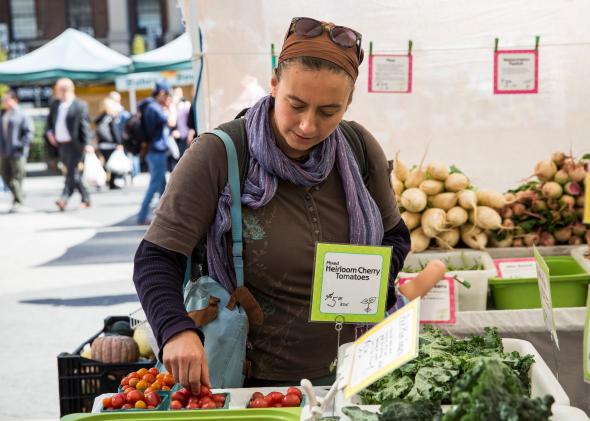A new study, commissioned by the U.S. Department of Agriculture and executed by the nonprofit research group Institute of Medicine, attempts to answer one very specific question: Should women enrolled in WIC—the Special Supplemental Nutrition Program for Women, Infants, and Children—be able to spend their vouchers on potatoes?
Whether or not pregnant women should be allowed to buy potatoes using WIC vouchers has been a political controversy for several years. WIC is a program intended to help poor pregnant and postpartum women supplement their diets with exceptionally nutritious foods. (WIC also provides vouchers for baby food and formula.) In 2006, the IOM decided that potatoes aren’t healthful enough to be considered a crucial food for pregnant and postpartum women, a decision that lobbyists for the potato industry immediately began trying to undo. Now comes this new study, reversing the IOM’s earlier conclusion and recommending that potatoes be included in the list of WIC foods. Whether or not WIC eventually adds potatoes to the list, the hoopla over one starch sheds light on the bureaucratic nightmare that is America’s social support system.
Nutrition during pregnancy is very important for the prevention of birth defects; research has linked inadequate fetal nutrition to all manner of chronic diseases. It’s hard to imagine a more important public health initiative than ensuring that all pregnant women get enough nutritious food to eat.
But it’s hard to imagine a less efficient system than WIC, which gives pregnant women and mothers of young children vouchers or EBT cards that they can only use to buy a very restricted selection of foods. Currently, the list for pre- and postpartum women includes juice (!), milk, breakfast cereal, cheese, eggs, fruits and vegetables, whole wheat bread, canned fish, canned and dried beans, and peanut butter. Recipients—who, let’s remember, are in the hormonal turmoil of pregnancy and/or caring for a squalling infant—must spend their own time and energy seeking out domestic cheese (imported isn’t allowed) or whole wheat bread (make sure there are no other flours in the ingredients list) in the specific quantities allowed by their WIC vouchers. WIC-approved foods aren’t hard to find, but examining labels to make sure that products meet WIC’s arbitrary restrictions seems like just one more strain on poor women’s already taxed mental resources.
I can imagine at least a couple of better ways for the government to ensure that expectant and new mothers get adequate nutrition. The first is for the government to cut out the middleman and just give mothers boxes of healthy foods selected by nutritionists to meet pregnant and postpartum women’s dietary needs. If the goal is to make sure women are eating a variety of healthy foods, why not deliver those foods to those women directly, instead of giving them a false sense of freedom while simultaneously restricting their choices? Delivering CSA-style boxes of kale, sweet potatoes, and black beans would eliminate the risk that WIC recipients spend their vouchers on kind-of-but-not-really healthy foods.
Another system that seems better than the current one is to actually increase women’s freedom about the food that they eat: Give poor women the resources to educate themselves about prenatal nutrition, and then give them money to make their own decisions about what to buy. Most expectant and new mothers, rich or poor, want to stay healthy for the sake of their children. If the government trusts wealthy women to take care of themselves adequately during and after pregnancy, why doesn’t it trust poor women to do the same?
The first solution is a practical challenge; the second a political one. Implementing either would mean unraveling the patchy, inefficient social safety net that passes for welfare in this country, which would no doubt be difficult and take a long time. But regardless of whether you think the government should have more or less control over what pregnant women buy, we should all be able to agree that it would be better for the government to spend money on poor pregnant women than to spend it commissioning reports like “Review of WIC Food Packages: An Evaluation of White Potatoes in the Cash Value Voucher.”
Correction, Feb. 18, 2015: The headline for this post originally misstated that women cannot buy potatoes with food stamps. The nutritional program that banned potatoes, WIC, is a separate program from the Supplemental Nutrition Assistance Program, which used to be formally known as (and is still colloquially referred to as) “food stamps.”
